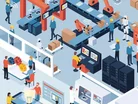Bosch: the value of connectivity in manufacturing facilities

In recent months, the impact of COVID-19 has hightent the value that organisations can gain from having connected manufacturing and logistics operations. The internet of things (IoT) has helped manufacturers to react quicker and with increased flexibility, providing real time analysis and transparency along the supply chain.“Connectivity makes companies less vulnerable and helps them keep an even keel,” commented Rolf Najork, the member of the Bosch board of management for industrial technology.
With the capabilities of industry 4.0, connected solutions can help to make manufacturing and logistics simpler, more efficient, flexible and robust. Some of the ways the industry is applying this technology to tackle operational challenges due lockdown regulations include: digital shift handovers where physical proximity is a challenge, as well as remote monitoring and remote maintenance of systems and machines, and the use of intelligent software to track goods and deliveries.
Priding itself as a pioneer in IoT, Bosch has been adopting connectivity solutions within its manufacturing and logistics as well as its customers since 2012.
Increasing factory productivity
Bosch believes that in a factory of the future, the only things that are static are the floors, walls and ceilings. A factory of the future will have the capability to continuously reinvent itself to suit the requirements, with a vision to have a set up that can adapt and produce different products and variants without the need for expensive retrofitting. With this approach it is possible to increase a factory productivity with industry 4.0 by up to 25%.
“Connectivity is essential for any company that wants to stay competitive. Industry 4.0 is a historic opportunity, offering enormous potential,” Najork says. “We are not only improving factory productivity, but also enabling companies to respond quickly and appropriately to changes.”
Individual projects vs. large scale implementations
In the organisation's home country - Germany - six out of 10 industrial companies that have more than 100 employees are using industry 4.0 capabilities, according to Bitkom. However, in many cases these are only partial implementations, with 80% of the country’s existing machinery yet to be digitalised. “There’s still a lot more we can do in manufacturing, and many points we can tweak and adjust. Our task now is to make Industry 4.0 the norm in all parts of the manufacturing sector,” Najork says.
Bosch solutions
As a leader in IoT capabilities, Bosch’s portfolio includes software packages for maintenance, monitoring, and logistics, robotics systems for manufacturing and transport, retrofit solutions for existing machinery, and assistance systems for machine operators.
In a recent debut, the company is introducing a software based 5G control technology that is compatible with third part applications. Known as ctrlX Automation, the technology is said to mark the end of isolated solutions in factories.
For more information on manufacturing topics - please take a look at the latest edition of Manufacturing Global.
- The University Manufacturing Circuit Boards from LeavesSustainability & ESG
- Tata & JLR: Supercharging Next Gen Automotive ConnectivityTechnology
- Schneider Electric's Commitment to Sustainable ManufacturingSustainability & ESG
- Lenovo & Saudi Alat Building Green Manufacturing FacilitySustainability & ESG

